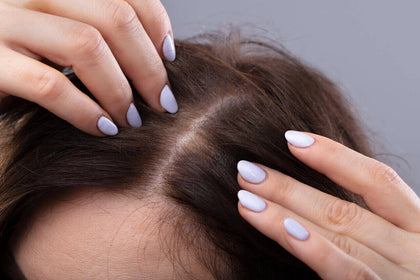Hair thinning is surprisingly common, but that doesn't make it any easier when you're the one experiencing it. Many women deal with thinning hair throughout their lives, and hair thinning at the crown in females can be triggered by changes in hormones, diet, overall health or lifestyle changes.
VEGAMOUR asked an expert for the latest information on what causes hair thinning at the crown in women, so read on to learn what you can do to get your thinning hair back to a healthy state ASAP. Plus, discover which products you should be using to combat thinning hair.
Common Causes of Hair Loss at the Crown for Females
Hair loss at the crown can happen in women at almost any time in life and for myriad reasons. This can make it difficult to pinpoint the root of the issue, but if you want to get to the root of your hair loss at the crown of your head, there are a few good places to start.
Before you impulsively sign up for a surgical hair transplant, learn to recognize the warning signs, causes and potential solutions of hair loss in women to take control of your hair health. Below are the common causes of hair loss at the crown in females:
Shop Now: VEGAMOUR Best-Sellers for Thinning Hair
Female-Pattern Hair Loss
You've probably heard of male-pattern baldness, but did you know that there's a female equivalent? It's called female-pattern baldness, or androgenetic alopecia, and it's estimated to affect about 30 million American women. Female-pattern hair loss or female-pattern baldness is characterized by hair thinning at the crown or part line that can then spread to a larger area of the head.
Androgenetic alopecia (also sometimes called androgenic alopecia) gets its name because it involves the androgen group of hormones, which include male hormones like testosterone. As with male-pattern hair loss, female-pattern baldness or female-pattern hair loss can be genetically inherited, though this is not always the case. The cause behind female-pattern baldness can be more difficult to identify than in males. Other known causes are underlying hormonal issues or a tumor affecting the endocrine system.
Female-pattern hair loss causes a change in the hair growth cycle. The anagen (growth) phase of hair shortens and occurs less frequently, and the hair follicles to shrink over time, impacting the hair's texture and thickness and causing new hair to grow in thinner and finer. Female-pattern hair loss is a slowly progressing form of hair loss, and eventually, if left untreated, new hair will stop growing altogether.
Shop: Fatima Dedrickson's Vegamour Picks
Hormones
Hormonal changes can contribute to hair loss at the crown in females. As you age, it's normal to experience periods of hormonal imbalances, including in pregnancy or in menopause. Female-pattern hair loss, discussed above, may result from hormonal changes as well.
Hormonal changes and the effect they have on the body can vary—they may be gradual, mild or short-lasting, such as during puberty or if you're on a specific form of birth control. Changes in your hair growth cycle, though, may be a sign of other more serious hormonal medical conditions, like polycystic ovary syndrome (PCOS), which can cause hair loss or excess hair loss on the face. VEGAMOUR spoke to celebrity hairstylist Cody Renegar about how hormonal changes can lead to hair loss.
"Hormones change as you age," Renagar said. "Estrogen and progesterone play an important role in every system in the body, and when anything disrupts that normal balance, it can lead to changes in the hair." If you've noticed unusual and unexpected changes in your hair, if excessive hair falls out or if you know you're experiencing hormonal changes, be in touch with a doctor to discuss possible interventions.
Health Conditions
Your hair health often reflects the health of the rest of your body. There are several scalp conditions—some of which may indicate underlying health issues—that can cause hair loss at the crown. Some include:
-
Autoimmune conditions, including like alopecia areata, scalp psoriasis and polycystic ovary syndrome (PCOS) can also impact hair loss.
Alopecia areata is a hair loss condition marked by round, coin-sized patchy hair loss that looks like bald spots. When left untreated, chronic alopecia areata can result in extensive, often permanent hair loss not just on your head, but also all over the body.
Scalp psoriasis is another autoimmune condition that can spread to the scalp, causing scaly patches of inflamed skin that leave you feeling uncomfortable and itchy. The excessive itching damages hair follicles, leading to temporary hair loss.
Polycystic ovary syndrome (PCOS) occurs when your ovaries produce unusually high levels of hormones called androgen, which can cause hair loss in women. With PCOS, women may experience hormones imbalances that can affect periods, hair growth, skin and weight. This condition affects about 15% of women, and as with androgenetic alopecia, androgens are the biggest contributing factor in female hair loss.
Increased Stress
Stress affects every system in the body, not to mention our emotional, mental and physical well-being. All that built-up internal stress can also show up externally, leading to thin hair and even hair loss. Stress-related hair loss is unfortunately extremely common, but the good news is that it's often temporary. Finding ways to manage the stress by exercising, meditating or going for a walk can help decrease the negative effects of stress.
Hair Care and Styling
When tending to your hair, the products and techniques you use can affect the health of your hair. For strong, healthy hair, it's best to avoid excessive or aggressive styling.
"Women often use styling treatments to have different textures and colors," explained Renegar. "Using hot styling tools, chemical treatments and dyes can cause hair thinning at your crown. Certain hairstyles, such as high ponytails, cause traction on hair follicles, which leads to inflammation and damage to the follicle."
Renegar recommends using claw clips instead of tight hair bands when styling your hair in a ponytail. Avoid tight hairstyles if you can help it. He also advocates against using hot tools daily, and encourages women to embrace their natural hair texture.
Nutritional Deficiencies
Eating well-balanced diet is important for your overall health, including hair health. Poor nutrition can slow or stop you hair follicles from growing.
"Nutrient deficiency could also be a reason – women may lack key nutrients like zinc or iron or biotin," said Renegar.
For a strong body and mind, provide your body with plenty of proteins, which are like building blocks for your hair. Support your follicles with foods rich in vitamins and minerals like vitamins A, B-7, C and E along with minerals like zinc and iron, which are essential for optimal hair health. If you eat a wide variety of healthy foods, you should be able to get all these important nutrients from your daily meals. To fill in any nutritional gaps, consider a hair-specific supplement alongside a healthy diet to give your hair an extra boost.
How to Support Hair at the Crown
Whether you're struggling with losing hair due to hormonal changes, health challenges, or emotional stress, we know the experience of having your hair fall out at the crown can take a toll on you, both physically and emotionally. But don't fret: There are ways to combat thinning hair at the crown and jumpstart the growing cycle.
Use a Hair Serum to Encourage Hair Health
There are four stages of hair growth: The anagen phase, which is your hair’s growth phase, the root to the resting phase, when your hair sheds. Any of the common causes of hair loss listed above can affect this cycle.
VEGAMOUR's GRO+ Advanced Hair Serum nourishes your hair from the inside out, encouraging healthy looking hair. Apply the topical treatment daily for best results to encourage thicker and fuller hair. You can expect to see visible results in as soon as 90 days, with peak results in around four months.
Check out this before and after from a customer who used GRO+ Advanced Hair Serum to fill our her thinning areas in on her crown.
VEGAMOUR’s proprietary plant-based, cruelty-free formula supports your hair without harsh chemicals, hormones, toxins or carcinogens that may cause side effects, making it safe for everyday use.
See a Doctor
Hair loss around the crown in women is extremely common, but some cases are more severe than others. If you're suffering from dramatic hair loss, we suggest making an appointment with your doctor, as this may be a sign of a more serious health condition. Your doctor may order blood tests to check your overall health and ensure you're not deficient in any important vitamins or minerals.
See: Take the Hair Quiz to Get a Custom Haircare Routine
Get Your Hormones Checked
Hormones are intricately connected to hair loss and hair growth. If you're experiencing sudden hair loss at the crown, check your family history for hormone-related conditions like PCOS, psoriasis, or any hereditary hair loss. These conditions are often passed down from generation to generation, and the sooner you identify the cause, the faster you can find relief.
Reduce Stress
Stress can steal your health if you don't put measures in place to mitigate it before it becomes too overwhelming. Keep your stress levels low by taking regular breaks, moving your body, and minimizing phone use and screen time.
Prioritize Sleep
Rest and recovery is an essential factor in hair growth. Sleep is necessary to reset, restore, and reenergize your body and mind. Plus, it supports healthy immune and brain function and aids in controlling stress, which affects hair growth. Try these nighttime rituals to reduce stress and encourage a good night's sleep:
- Commit to a routine schedule for what time you go to bed and wake up each day, including weekends.
- Put down your phone at least an hour before bed. Or, better yet, keep your phone outside of the bedroom altogether so you aren't tempted to scroll.
- Use meditation to put you in a relaxed state before bedtime.
- Listen to calming sounds or soothing music to help you fall asleep.
- Keep a notebook by your bed so you can write down any thoughts or pressing items on your to-do list that are keeping you up at night.
#include-related-slider#
Boost Your Hair Wellness
Female hair loss is a common experience throughout a woman's lifetime, and it's nothing to be ashamed of. Hormonal imbalances, health conditions, stress, and diet can all impact your hair's texture, thickness, and length.
While there is no miracle hair loss treatment, there are practical steps you can take to get to the root cause of thinning hair loss and improve your hair health. If hair loss at the crown is concerning you, don't be afraid to reach out to your doctor for diagnosis and treatment options. Then, follow up with an optimized daily routine that includes a healthy diet, stress reduction techniques and healthy hair products that can help encourage thicker, fuller-looking hair.
More From VEGAMOUR
- Shop: Shampoos for Thinning Hair
- Should You Be Using a Clarifying Shampoo?
- 10 Hair Washing Mistakes You're Making
- Female Hair Loss at the Frontal Hairline Explained
Photo credit: AndreyPopov/iStock




















